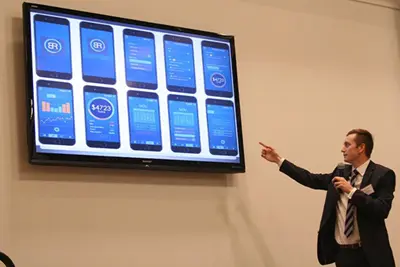24-Hour Innovation Hub Event Draws Nearly 100 Students from Across the Region
 Image by Meghan Moore
Image by Meghan Moore
03/31/2016
By David Perry
It was a Friday evening and dozens of students from around the region flocked to downtown Lowell. They organized themselves into teams of five or fewer and settled into any available space on the third floor of Lowell’s central hotbed of creativity and invention, the Innovation Hub at 110 Canal St.
So began UMass Lowell’s first hackathon, the Hawkathon.
The iHub served as ground zero for a 24-hour burst, drawing 84 students, half from the likes of MIT, Simmons College, Rhode Island School of Design, Wellesley College, Brandeis University; the other half from UMass Lowell.
They came from as far west as Chicago. There was a student from Delaware. One man, Didier Louboutin, drove from the University of Quebec in Montreal just to observe what happens when nearly 100 students team up to put their minds to solving problems large and small.
It was a hackathon — dubbed Hawkathon in honor of UMass Lowell mascot Rowdy the River Hawk — organized by a core group of nine students headed by sophomore plastics engineering majors Stephen Kender and Terry Fox-Koor. Students broke out their software development, graphic design, hardware and project management skills to try to bring ideas to life.
Kender started organizing the event last fall and as things got rolling Friday evening, he was a bit frantic, running from floor to floor to make sure all was in place for the hackers.
His goal for the session?
“You know, it would be great to get a couple of good startup ideas to build off.” He paused. “You know what I’d really like? For more students to be creative with their energy and talents.”
 Image by Meghan Moore
Image by Meghan Moore
By the time things wrapped up on Saturday night, teams of hackers came up with apps that ranged from the recreational (“Gear Pong,” a cell phone-controlled beer pong-playing robot) to the altruistic (an app for connecting volunteers to non-profit organizations) to the practical (a smart fridge app that keeps track of fridge contents, expiration dates and even creates recipes). Six teams won prizes of cash and products.
UMass Amherst junior Kyle Toth, who had attended other hackathons, was drawn by the creative energy and the collaborative spirit of a group project.
“It’s 24 hours of taking ideas and making them into as full of a product as you can," he said. "In the past, I’ve worked on a virtual reality version of Tetris, an app that matches up people eating alone so they can share a table at the same restaurant” and an app to help travelers understand the culture they’re about to visit.
“Some people like the end product,” said Toth, “but for me, it’s about working with a team, really figuring out how to do something. The rest can happen later.”
Major League Hacking (MLH), which bills itself as “the official student hacker’s league,” was on hand to lend support. The organization helps organize more than 200 such events a year across the globe, involving some 80,000 students, according to Jade Yee, MLH’s operations specialist.
It wasn’t all work. Organizers cautioned the hackers to rest if they needed it. Food, water, coffee and energy drink supplies seemed bottomless. There was yoga at sunrise for those who wanted to stretch and rebalance.
Sponsors threw their support behind the event, from communications integration system company Twilio to Digital Federal Credit Union to a slew of other companies. Facebook flew out Alvin Portillo from its Menlo Park, Calif., campus. He was among the sponsors accepting resumes and fielding queries from behind a table on the iHub’s second floor.
 Image by Meghan Moore
Image by Meghan Moore
The event was “proof that this passion for innovation, creative thinking and collaboration is alive and well in the next generation of great New England technology minds,” said Jim Welch, chief product officer for Chelmsford-based Kronos Inc., which moves to Lowell next year. Kronos is planning “to deepen our relationship with UMass Lowell through our co-op program and student events.”
Hala Lotfy of Wellesley College and Nick Zuber of UMass Lowell teamed up to work on a “political speech generator.” Enter public sentiment about a subject into a computer, and their application would produce a speech agreeing with it.
“Nick wanted to call it the Hillary-bot, but they’d never let me back into Wellesley,” said Lotfy.
“The great thing about this is it’s not something I could accomplish in a classroom,” said Ed Laird of Berkshire Community College, who had participated in one previous hackathon. “It’s project-based learning, which is actually applying what you learn.”
His team was working to develop an app to connect freshman students with upper class students for recommendations on everything from teachers to books to eating spots.
And sometimes, the mother of invention really is a mother.
Gregory Dorian, the UMass Lowell mechanical engineering major who came up with the idea for the smart fridge application, said it sprung from when he would drive his mother crazy by talking to her with the fridge door open.
“And the idea grew from there,” he said.
Kender said the Hawkathon went “even better than I thought,” and he will be following ideas to see if teams “make any moves toward marketing an actual product or service.”




